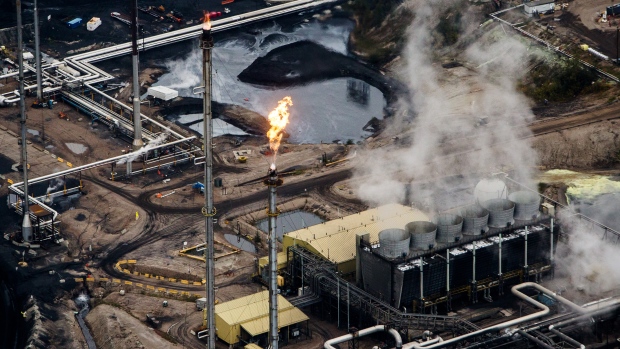Nov 28, 2018
Steep price discounts place oil patch credit ratings in danger, DBRS warns
The Canadian Press

CALGARY -- Big Canadian oil and gas companies face downgrades in their credit scores if current steep price discounts for their products continue, warns credit rating agency DBRS Ltd. in a report released Wednesday.
Such rating cuts could affect the companies' ability to access credit to fund future growth and potentially increase what they pay to service their debt.
"Currently the differential is very high on heavy, it's very high on light, it's very high on synthetic, so that's putting a lot of pressure on cash flows and, obviously, credit metrics as a result," said Victor Vallance, senior vice-president of energy, global corporates, for DBRS.
"It's very unusual. I've never seen ... this disconnect between Canada and the rest of the world, unfortunately, because of the increase in supply and not sufficient enough expansion of takeaway capacity."
DBRS last issued a similar warning in early 2016 after New York-traded West Texas Intermediate prices crashed to below US$30 per barrel, he said, but a price recovery allowed most firms to escape being downgraded.
The recent drop in London-traded Brent and WTI oil prices makes the current problem even more acute for Calgary-based oil and gas producers, Vallance said, estimating that their credit ratings will deteriorate if discounts don't improve significantly in the next six months or so.
New pipeline export capacity isn't expected to materialize until late 2019 when Enbridge Inc.'s Line 3 replacement project is forecast to be completed but crude-by-rail options have grown, with the National Energy Board reporting a sixth consecutive monthly record export level of 270,000 barrels per day in September.
The province of Alberta has been urging the federal government to help it add 120,000 bpd of train capacity but Ottawa has been reluctant to get on board.
On Wednesday, the province announced it had authorized the Alberta Petroleum Marketing Commission to talk to manufacturers and suppliers to acquire rail capacity, with the new cars scheduled to be online by late 2019.
Increases in crude-by-rail were limited by the availability of locomotives and crews earlier this year but that has changed thanks to investments by both Canadian National and Canadian Pacific railways, said John Zahary, CEO of Calgary-based Altex Energy.
His company is loading about 50,000 bpd these days at its terminals in Alberta and Saskatchewan, up from 35,000 bpd in March, but it has capacity to move 150,000 bpd, he said, estimating overall rail terminal capacity is about 700,000 bpd in Western Canada.
"What's the constriction in the system?" he said. "Railway capacity six months ago was an issue but all of the railways in north America have invested to build their capacity ... the issue is railcars."
Zahary said he supports the province's goal but says it won't come cheaply, with thousands of rail tanker cars needed at a cost of between $120,000 and $150,000 each to buy or about $1,200 per month to rent.
At a conference in Florida on Wednesday, CN chief financial officer Ghislain Houle said his railway is still reluctant to expand in crude-by-rail because of worries the oil producers will leave when new pipelines are built.
"We're not banking on crude. We know that crude is a short-term business for the railroad. Crude wants to go by pipeline," he said.
"Obviously with what's happening in the pipeline environment right now, crude is an opportunity for railroads."
CN has already matched its 2014 record of 130,000 carloads of crude shipped (an average of about 250,000 bpd) this year, and is on track to exceed that number along with receiving 140 new locomotives next year, he said.
Vallance says the difference between WTI and Western Canadian Select bitumen-blend crude has narrowed recently because more WCS oil is being shipped via rail and companies are voluntarily curtailing output to avoid low prices.
After hitting highs of over US$52 per barrel in October, the WCS-WTI differential has settled at about US$32 per barrel this week. Upgraded synthetic crude from oilsands mines is selling at a US$22 discount to WTI and Edmonton light oil, which is comparable in quality to WTI, is receiving about a US$27 discount, DBRS reports.
Vallance said voluntary production cuts aren't expected to affect credit ratings because they are considered a temporary measure.





